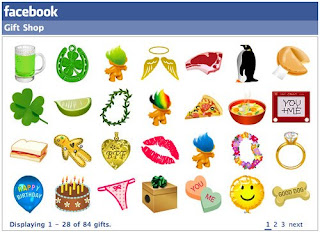Years ago, I was given The Gift Economy by David Cheal to read, a book focusing on the tensions between market relationships {political economy} and social ones {moral economy} in today's capitalist societies. This often manifests itself in terms of tensions between the rational and the emotional. While gifts may be given for instrumentalist means, they often are not. Recent thinking considers gifts to be a social process, one that has a significant economic impact, given the amount spent on gifts.
So, how is this interplay of the economic and the social affected by social media? In my current work, I’ve been thinking of the use of Facebook by organizations, particularly in the realm of philanthropy. Organizations have been embracing the idea of creating relationships with constituents, rather than focusing on transactions. Health non-profits often provide information and advocate on behalf of their constituents. By doing so, this creates a person-organization relationship and ideally leads to greater levels of philanthropy {economic resources for the non-profit}. The key is that the relationship must have salient meanings for the constituents, i.e., the brand meaning system. Depending on the context, this is often tied to outcomes, e.g., cures for diseases, social change, identity, etc.
Social media and social networking sites like Facebook not only foster person-organizational relationships via information disemmination and provision of services, but also peer-to-peer relationships. These relationships are social, but are within a capitalist market context. Hence, we return to the gift. We manage relationships through gift-giving and other behaviours, through the management of symbols, such as $1 gifts on Facebook
Social media has the ability to move constituents from this model
Organizational Activities -> Org.-Person Relationship -> Outcomes
more towards this one
Organizational Activities -> Communities of practice {e.g., web community} -> Outcomes
The latter being facilitated by the Internet and with the possibility of a richer set of outcomes stemming from an engaged community. We want gifts to be expressive of our relational ties, hence full of meanings, within a given social context, e.g., a community of practice.
Facebook is a global player, but still needs a solid revenue model. Apple's success with "apps" show the power of a platform to deliver value, often at a low price-point. The Facebook platform should be developed in line with how people, how a large number of people, actually engage in symbolic relationship management, tied to other strategies, such as
* Bling gifts that are expressive of sentiments {various media}
* Donations and sponsorships
* Online events to engage community members
* Free/Low-cost personalized apps that add value, e.g., health monitoring, reminders, alerts, etc
Organizations are still figuring out how to use social media and Facebook is still figuring out how to deliver value. All I can say its future isn't online ads and organizations just paying lip service to their constituencies with social media is as transparent as this
